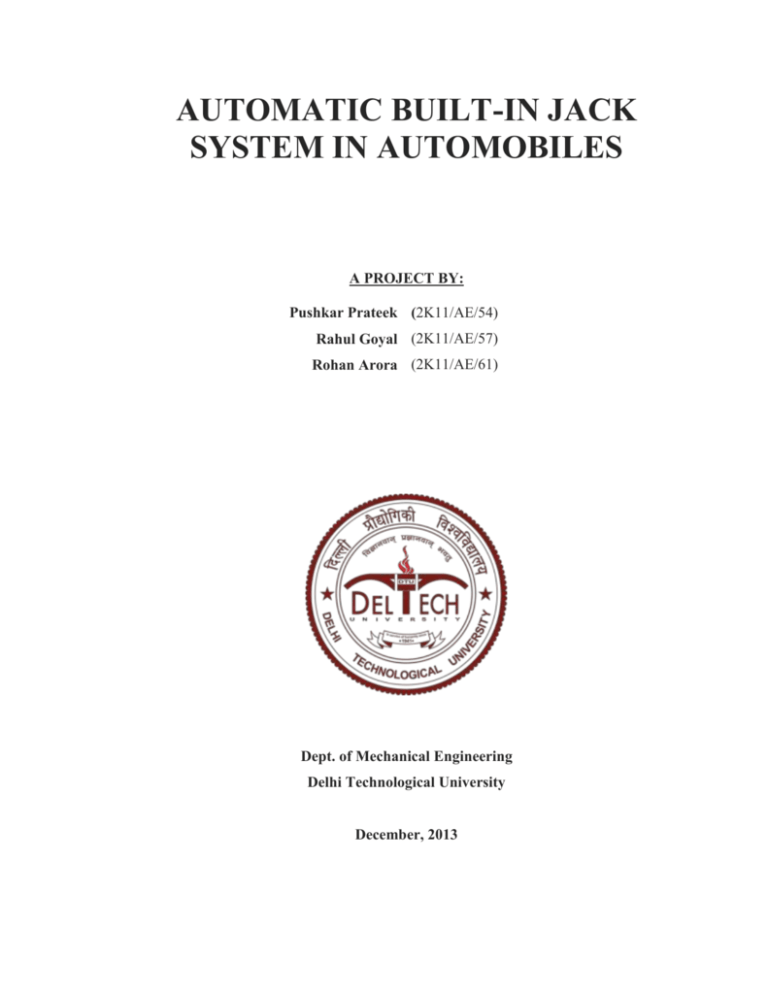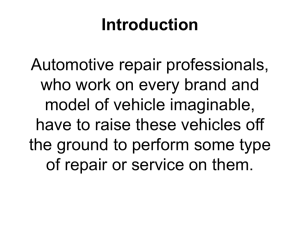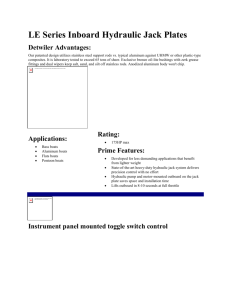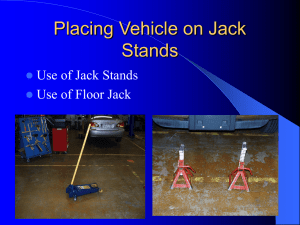Automatic Built-In Jack System in Automobiles Project Report
advertisement

AUTOMATIC BUILT-IN JACK SYSTEM IN AUTOMOBILES A PROJECT BY: Pushkar Prateek (2K11/AE/54) Rahul Goyal (2K11/AE/57) Rohan Arora (2K11/AE/61) Dept. of Mechanical Engineering Delhi Technological University December, 2013 AUTOMATIC BUILT-IN JACK SYSTEM IN AUTOMOBILES A PROJECT REPORT Submitted by ROHAN ARORA PUSHKAR PRATEEK RAHUL GOYAL Under the guidance of Mr. PARAS KUMAR ASSISTANT PROFFESOR MECHANICAL ENGINEERING DEPARTMENT FOR THE FULFILLMENT OF THE 5TH SEMESTER MINOR PROJECT-I OF AUTOMOBILE ENGINEERING Bachelors of technology In AUTOMOBILE ENGINEERING Of DELHI TECHNOLOGICAL UNIVERSITY DELHI December, 2013 STUDENTS’ DECLARATION We, Pushkar Prateek, Rahul Goyal, and Rohan Arora hereby certify that the work which is being presented in the minor project-I entitled “Automatic built-in jack system in Automobiles” is being submitted in the partial fulfillment of the requirements for the degree of B.Tech (Automobile Engineering) at the Delhi Technological University is an authentic record of our own work carried out under the supervision of Mr. Paras Kumar. We have not submitted the matter embodied in this project for the award of any other degree or diploma. Also, it has not been directly copied from any source without giving its proper reference. Pushkar Prateek Rahul Goyal Rohan Arora 2K11/AE/054 2K11/AE/057 2K11/AE/061 3|Page CERTIFICATE BY SUPERVISOR This is to certify that the work contained in this minor project-I entitled “Automatic builtin jack system in Automobiles” by Pushkar Prateek, Rahul Goyal, and Rohan Arora is the requirement for the partial fulfillment of the degree of B.Tech (Automobile Engineering) at the Delhi Technological University. This work was completed under my direct supervision and guidance. The students have done their work with utmost sincerity and diligence. The work embodied here has not been submitted for the award of any other degree/diploma to the best of my knowledge. Mr. Paras Kumar Assistant Professor Dept. of Mechanical Engineering Delhi Technological University 4|Page TABLE OF CONTENTS SNo. TOPICS Pg. No. i. Abstract 6 1. Introduction 7 1.1 General introduction 7 1.2 Current scenario 7 1.3 Current mechanism of jack operation 10 1.4 Pros and cons of existing mechanisms 13 Literature Review 14 2.1 Past Work Done 14 2.2 Research paper referred 16 3.1 Our purpose and objectives 18 3.2 Basic principle used 19 3.3 Jack driving power mechanisms 20 3.4 Position of jacks 21 3.5 Controlling of jacks 23 Advantages and disadvantages of this system 24 Conclusion 25 References 26 2. 3. 5|Page ABSTRACT Idea of “automatic inbuilt jack system in automobile (cars)” is to provide a novel jacking system attached to the chassis of the automobile itself. This inbuilt jack can be actuated from inside of the vehicle with the help of switches provided on the dash board. An Automobile inbuilt hydraulic jack can be easily operated by a single push button provided on the dash board. The jack will be installed on both the sides of chassis according to the weight distributions of the car. Similarly it will be installed on the other side of the car. The jacks actuate separately for either side of car as per the breakdown condition. The car gets lifted and load gets distributed on three point i.e., plunger or ram of hydraulic cylinder and tires except which is being lifted. At a time maximum of two jacks (either both front or rear) can be used to lift the automobile in case of any breakdown or for reconditioning the same. This jack will be very useful for all the senior citizens and especially for females (ladies) who find it extremely difficult to operate the jack manually in any breakdown condition. Keeping the practical simulation and fabrication in view, mainly mechanical or hydraulic jack can be used. Pneumatic jack is being ruled out due to compressive nature of gases, hence less power would develop and complex design of the system. Hydraulic jack looks promising as incompressible fluid will comparatively provide more power. Increase in weight of the vehicle, design of the jack and last but not the least cost increase needs optimization. The motive behind using hydraulic system instead of a pneumatic system is the more power produced by the system and simple in design as compared to a pneumatic design. As the hydraulic oil is incompressible so the lifting capacity is more in comparison with the pneumatic system which operates on air which is compressible. 6|Page 1. INTRODUCTION 1.1 GENERAL INTRODUCTION Our survey in the regard in several users of vehicles, revealed the facts that mostly some difficult methods were adopted in lifting the vehicles for reconditioning. Now the project is mainly concentrated on this difficulty, such that the vehicle can be lifted from the floor land without application of any impact force. The motorized screw jack has been developed to cater to the needs of small and medium automobile garages, which are normally man powered with minimum skilled labor. In most of the garages the vehicles are lifted by using screw jack. This needs high man power and skilled labour. In order to avoid all such disadvantages, the built-in jack should be designed in such a way that it can be used to lift the vehicle very smoothly without any impact force. The operation is made simple so that even unskilled labour can use it with ease. As automobile market is growing, advance concepts are being implemented to make automobiles more and more versatile and comfortable. Many concepts are implemented day to day to make automobile better and better these days. One such concept is of variable height adjustment in vehicle by adjusting its ground clearance. In this way the vehicle becomes more versatile and can be operated over variety of bad as well as good road conditions. 1.2 CURRENT SCENARIO: WHAT IS A JACK (13)? A mechanical jack is a device which lifts heavy equipment and vehicles so that maintenance can be carried out underneath. Car jacks usually use mechanical advantage to allow a human to lift a vehicle by manual force alone. More powerful jacks use hydraulic power to provide more lift over greater distances. Mechanical jacks are usually rated for maximum lifting capacity. Automotive jacks are classified as: 7|Page Automotive Jacks Hydraulic Bottle Shape Trolley(Floor Jack) 1. Hydraulic jacks: A. Bottle shape (11) : B. Floor jack : 8|Page Screw Type Scissor jack Bumper Jack 2. Screw Type A. Scissor jack : B. Bumper jack (10) : 9|Page 1.3 CURRENT MECHANISM OF JACK OPERATION Hydraulic jacks: Hydraulic jacks are typically used for shop work, rather than as an emergency jack to be carried with the vehicle. In these jacks, by operating the handle, which is a lever (a simple machine), fluid is compressed and routed to an actuating cylinder. This results in lift. Hydraulic jacks are often used to lift elevators in low and medium rise buildings. WORKING: A hydraulic jack uses a fluid, which is incompressible, that is forced into a cylinder by a pump plunger. Oil is used since it is self-lubricating and stable. When the plunger pulls back, it draws oil out of the reservoir through a suction check valve into the pump chamber. When the plunger moves forward, it pushes the oil through a discharge check valve into the cylinder. The suction valve ball is within the chamber and opens with each draw of the plunger. The discharge valve ball is outside the chamber and opens when the oil is pushed into the cylinder. At this point the suction ball within the chamber is forced shut and oil pressure builds in the cylinder. TYPES OF HYDRAULIC JACKS 1. Floor Jacks: These jacks are primarily used to lift heavy equipment from the surface of the floor. It is more often used to change the tyres of vehicles. 2. Hydraulic Bottle Jacks: Hydraulic bottle are versatile since they can be placed in tight spots and provides good leverage. They have a longer handle as compared to rest of the hydraulic jacks and push up against a lever that gives a lift to the main lift arm. With their use, it is possible to give a greater lift per stroke. 10 | P a g e 3. Long Ram Jacks: In simple terms, it is a hydraulic jack with a long size ram. Its lever handle is quite easy to use. It is primarily used for performing various types of repairing work. 4. Shop Press jacks: They are of great use in press jobs where there arises a need to generate tremendous pressure with minimum effort. SCREW JACKS: A jackscrew is a type of jack which is operated by turning a leadscrew. In the form of a screw jack it is commonly used to lift heavy weights such as the foundations of houses, or large vehicles. In the case of a screw jack, a small force applied in the horizontal plane is used to raise or lower large load. A jackscrew's compressive force is obtained through the tension force applied by its lead screw. Harsh environment applications such as steel mills, mining, oil & gas, and primary metal smelting operations, here screw Jacks are preferred over hydraulics. In these environments where hydraulic cylinders would simply not survive the fluctuating temperatures. A jackscrew's threads must support heavy loads. In the most heavy-duty applications, such as screw jacks, a square thread or buttress thread is used, because it has the lowest friction. In other application such as actuators, an Acme thread is used, although it has higher friction. 11 | P a g e TYPES OF SCREW JACKS 1. Scissor jack: A scissor jack is a device constructed with a cross-hatch mechanism, much like a scissor, to lift up a vehicle for repair or storage. It typically works in just a vertical manner. The jack opens and folds closed, applying pressure to the bottom supports along the crossed pattern to move the lift. When closed, they have a diamond shape. Scissor jacks are simple mechanisms used to drive large loads short distances. The power screw design of a common scissor jack reduces the amount of force required by the user to drive the mechanism. Most scissor jacks are similar in design, consisting of four main members driven by a power screw. A scissor jack is operated simply by turning a small crank that is inserted into one end of the scissor jack. This crank is usually "Z" shaped. The end fits into a ring hole mounted on the end of the screw, which is the object of force on the scissor jack. When this crank is turned, the screw turns, and this raises the jack. The screw acts like a gear mechanism. It has teeth (the screw thread), which turn and move the two arms, producing work. Just by turning this screw thread, the scissor jack can lift a vehicle that is several thousand pounds. 2. Bumper jacks: They were used earlier and are not prevalent nowadays. 12 | P a g e 1.4 PROS AND CONS OF BOTH MECHANISMS Screw Jacks and Hydraulic Cylinders each offer their own unique advantages as lifting and positioning devices SCREW JACKS: Over time, hydraulic cylinders can lose position or “creep” due to loss of pressure at the pump or through the cylinder seal. In some cases, a damaged hydraulic line or hose can cause complete loss of position. This will not happen with Screw Jacks since the primary lifting mechanism (acme thread) is inherently self-locking i.e. the jack will not “creep” even when the drive motor is shut down. Screw jacks are often preferred for their self-locking characteristics, ability to withstand harsh environments, minimal drive components, and high duty cycles. Scissor jacks are handy because they are compact when they are in their contracted position. Harsh environment applications such as steel mills, paper mills, mining, oil & gas, and primary metal smelting operations are the areas where Screw Jacks are preferred over hydraulics. Jacks commonly operate for many years in these environments where hydraulic cylinders would simply not survive the fluctuating temperatures and gritty conditions without frequent breakdown. Additional benefits of screw jacks include minimal drive components and setup simplicity. Where hydraulics require a pumping device, oil reservoir, and oil lines, Joyce Screw Jacks can be directly connected to a drive motor and a simple on/off control device. HYDRAULIC JACK: These jacks are sturdier than the scissor jacks and can lift heavier loads. Over time, hydraulic cylinders can lose position or “creep” due to loss of pressure at the pump or through the cylinder seal. 13 | P a g e 2. LITERATURE SURVEY 2.1 PAST WORK DONE EARLIEST JACK DEVELOPMENT: There is evidence of the use of screws in the Ancient Roman world but it was Leonardo da Vinci, in the late 1400s, who first demonstrated the use of a screw jack for lifting loads. HIS DESIGN: Leonardo design used a threaded worm gear, supported on bearings, that is rotated by the turning of a worm shaft to drive a lifting screw to move the load - instantly recognizable as the principle we use today. FURTHER IMPROVEMENTS: Screw type mechanical jacks were very common for jeeps and trucks of World War II vintage. For example, the World War II jeeps were issued the "Jack, Automobile, Screw type, Capacity 1 and 1/2 ton". With the industrial revolution of the late 18th and 19th centuries came the first use of screws in machine tools, via English inventors such as John Wilkinson and Henry Maudsley. During the early 1880s in Coaticook, a small town near Quebec, a 24year- old inventor named Frank Henry Sleeper designed a lifting jack. Like da Vinci’s jack, it was a technological innovation because it was based on the principle of the ball bearing for supporting a load and transferred rotary motion, through gearing and a screw, into linear motion for moving the load. The device was efficient, reliable and easy to operate. It was used in the construction of bridges, but mostly by the railroad industry, where it was able to lift locomotives and railway cars. The idea was based on the familiar lever and fulcrum principle and he needed someone to manufacture it 14 | P a g e There was clearly potential for using this technology for other applications and only 10 years later, in 1940, the first worm gear screw jack, that is instantly recognizable today, was offered by Duff-Norton, for adjusting the heights of truck loading platforms and mill tables. Since then the product has evolved to push, pull, lift, lower and position loads of anything from a few kilos to hundreds of tonnes. One of the biggest single screw jacks made to date is a special Power Jacks E-Series unit that is rated for 350 tonnes even in earthquake conditions for the nuclear industry. 15 | P a g e 2.2 RESEARCH PAPERS REFERRED 1. Integrated Automated Jacks for 4-wheelers (8) P.S. Rana, P.H. Belge1, N.A. Nagrare1, C.A. Padwad1, P.R. Daga1, K.B. Deshbhratar1 ABSTRACT An Automobile hydraulic jack can be easily operated by a single push button provided on the dash board. The jack will be installed on both the sides of chassis according to the weight distributions of the car. Similarly it will be installed on the other side of the car. The system operates on hydraulic drive which consists of three main parts: Hydraulic pump, driven by an electric motor, hydraulic cylinder to lift the vehicle. The hydraulic jacks actuate separately for either side of car as per the breakdown condition. The car gets lifted and load gets distributed on three point i.e., plunger or ram of hydraulic cylinder and two tires opposite to side which is lifted. This jack will be very useful for all the senior citizens and especially for females (ladies) who find it extremely difficult to operate the jack manually in any breakdown condition. The motive behind using hydraulic system instead of a pneumatic system is the more power produced by the system and simple in design as compared to a pneumatic design. As the hydraulic oil is incompressible so the lifting capacity is more in comparison with the pneumatic system which operates on air which is compressible. 2. ANALYSIS OF AUTO CAR JACK (7) M.M. Noor1, K. Kadirgama1 and M.M. Rahman1 ABSTRACT 16 | P a g e Side road emergency is always a common headache especially during the tire punctured. This paper discussed the development of the car jack for emergency usage with using internal cigarette lighter power (12volts). The automatic easy car-jack utilized this power source to save individuals internal energy. Gear ratio was used to increase the lifting power. The car jack was developed utilizing the Solidworks® and analysed using Finite Element Analysis to check safety factor and force acting. The car jack tested on real car and it proven it can be used commercially 3. Inbuilt Hydraulic Jack in Automobile Vehicles (9) ABSTRACT: An inbuilt hydraulic jack system is attached to automobile vehicle on front and rear part of the chassis. An automobile hydraulic jack system can be easily attached to all currently manufacture automobile chassis and frames. There is a front suspension hydraulic jack that is mounted centrally to the front suspension of an automobile between its front wheels. There is also a rear suspension hydraulic jack that is mounted centrally to the rear suspension of the automobile between its rear wheels. The system operates from a compressed fluid reservoir tank that has connections for the front and rear car jack outlets. Additional outlets can be added to the compressed fluid reservoir tank for connecting a hydraulic lug wrench and another for a tire inflating hose. The Major Project entitled “Inbuilt hydraulic jack in automobile vehicle” Worked on the principal of hydraulic power and operated by 12 Volt DC current, solves the all major problem of maintenance of all automobiles specially the heavy vehicles like truck and bus. This work, if implemented, would definitely help in the maintenance of automobiles and also in saving of time. 17 | P a g e 3.1 OUR PURPOSE AND OBJECTIVES To provide a safe and simple automatic jack system without use of manual effort. To provide an alternative jack system that can operate without external sources of actuation, such as extra hydraulic pumps, reservoirs, or pneumatic systems. To provide a novel jack system that can be operated from within the vehicle by means of a dashboard control panel. To provide a novel jack system that is directly and permanently incorporated into the vehicle frame in such a way as to prevent the additional risk of damage or weathering. Limitations of the current floor jack: Current floor jacks – Manually mounted on the vehicle frame, and necessitate an external hydraulic pump or pneumatic system or mechanical force. They can’t be used by old people or the increasing number of lady drivers. Problem to be solved: Make the floor jack convenient and efficient to use from within the automobile. Also at the same time the jack system assembly should be feasible and economically practical and the weight of the vehicle also should be not be largely increased. Solution to be investigated: Development an automatic built-in jack 18 | P a g e 3.2 FUNDAMENTAL CONCEPT PASCAL’s LAW (12): His law states that pressure in a confined fluid is trans-mitted undiminished in every direction and acts with equal force on equal areas and at right angle to a container's walls as shown in fig below: 19 | P a g e 3.3 What We Propose: Power can be derived in the following ways for the movement of the jack: Power can be taken from the running engine on neutral gear. Power can be taken directly from the battery. Jack can be raised with the help by a hybrid mechanism which uses electric energy from the battery and drives the motor to operate a hydraulic jack. One of the above options can be chosen according to their efficiency and cost effectiveness. We are currently trying to take the power by last method which is by a hybrid mechanism which uses electric energy from the battery and drives the motor to operate a hydraulic jack 20 | P a g e 3.4 POSITION OF JACKS IN VEHICLES Bottom view of the automatic jack system illustrating the position of four jacks in the retracted position in a car marked with ‘4’. Lateral view of the vehicle illustrating the relative position of two jacks in the lowered position, car. 21 | P a g e Bottom view of the automatic jack illustrating the position of four jacks in the retracted position, in a truck or a SUV vehicle marked with ‘4’. Lateral view of the vehicle illustrating the relative position of two jacks in the lowered position, truck. 1. WHEELS OF VEHICLE 2. GEARBOX 3. ENGINE 4. POSITION OF JACKS 5. REAR AXLE 22 | P a g e 3.5 CONTROLLING THE MOVEMENT OF JACKS Schematic top view of the control panel in automobile illustrating the layout of the control switches. This way we can provide electrical switches in the instrument panel inside the car which will provide enhanced convenience of the operation of jacks for the passengers. 23 | P a g e ADVANTAGES OF THIS SYSTEM The maintenance of vehicle will be very easy and cheap. This type of system is very useful for ladies and old people since during the problem of puncher of tyres, they can easily change the wheel. Time saving of maintenance This is also very useful for heavy vehicles such as trucks and buses, since there is a common problem of breaking leaf spring plates A single person can go on a long drive without worrying about getting stuck in the way. DISADVANTAGES OF THIS SYSTEM Cost will increase slightly. Weight of vehicle will increase slightly. 24 | P a g e CONCLUSION Automatic inbuilt jacking system in automobiles will not only save the effort of a person but will also save one’s precious time under critical circumstances. This concept will eliminate the need of carrying a conventional mechanical scissor jack while travelling. It is a very feasible concept and if worked over cautiously, will become popular very soon. Motor operated mechanical jacks are already in the market but the jack’s design is the area of concern. In order to make built-in jack system practical, jack’s shape and type need modification. Mechanical jacks are pretty easily operated but their effectiveness and maintenance may become an issue as they will be move with chassis, constantly underneath hence, chances of rusting and damage is high. Hydraulic jacks look convenient to use and can also prove quite effective and easy to maintain (as completely closed) in long run, they will provide more power too but there are also some challenges like keeping low production cost and designing of jack which can be carried with the chassis given, common ground clearance level of an automobile, and keeping in check the increase in weight of automobile. After successful implementation of the above idea in small passenger cars, future developments can be made in design to apply the same in heavy duty automobiles also. 25 | P a g e REFERENCES 1. Mueller, Pamela, and Thomas L. Mueller. "Built In-Power Jack." U.S. Patent Number 4,993,688, 1991 [2]. 2. William Cox (July 2001), "Light Talk on Heavy Jacks", Old-House Journal. 3. Parr, Andrew. Hydraulics and Pneumatics: A Technician's and Engineer's Guide. 1st Edition. Oxford: Butterworth-Heinemann, 1999. Print. 4. Mosely, David J. "Vehicle Mounted Hydraulic Jack System." U.S. Patent Number 5,377,957,1995. 5. http://en.wikipedia.org/wiki/Jack_(device). 6. Built-in power jack, US 4993688 A Thomas L. Mueller, Pamela A. Mueller. 7. Noor,M.M., Kadirgama K., Rahman,M.M .,ANALYSIS OF AUTO CAR JACK,2010. 8. Rana P.S., Belge P.H., Nagrare N.A., Padwad C.A., Daga P.R., Deshbhratar K.B. Mandavgade N.K. Integrated Automated Jacks for 4wheelers,2012. 9. Abuzaid Mohammed, Hasnain Mohammad, Alam Shabaj, Khan Sohail, Agarwal Surendra , Inbuilt Hydraulic Jack in Automobile Vehicles,Vol.2 , 2013. 10. http://www.northerntool.com/shop/tools/product_200318919_200318919 11. http://www.deltahoist.com/catalog/product/15 12. http://en.wikipedia.org/wiki/Pascal's_law 13. http://en.wikipedia.org/wiki/Jack_(device) 14. http://www.youtube.com/watch?v=E0RZhi52zu4 26 | P a g e 27 | P a g e








